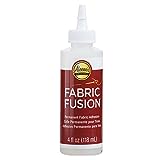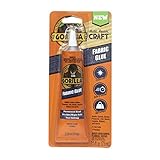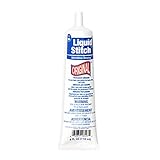🌅 Introduction
Welcome to our comprehensive fabric glues buying guide, where we’ll help you find the perfect adhesive for all your fabric crafting needs. Whether you’re a seasoned DIY enthusiast or a beginner looking to explore the world of fabric projects, finding the right glue is crucial for ensuring long-lasting and professional-looking results. In this guide, we’ll discuss the top fabric glues available in the market, their unique features, and what to consider before making a purchase. So, let’s dive in and discover the best fabric glue that will bring your creative ideas to life!
🏆 Our Top 5
- Permanent bond between fabrics and other embellishments
- Nontoxic, Machine washable and stays flexible after washing
- Applies and dries clear, Works on a variety of fabrics
- Easy soap and water cleanup before it dries
- Won’t string when you apply it
- Perfect project-sized bottles
- Use Sparingly - Too much will slow the process and oversaturate the fabric which weakens the adhesion
- Package contains three .66fl oz. bottles
- 100% WATERPROOF: Formulated to provide a fast setting, permanent bond that remains flexible after washing.
- CRYSTAL CLEAR: This high strength adhesive dries crystal clear and can be used on a variety of surfaces, making it the perfect alternative to a traditional needle and thread.
- WASHER AND DRYER SAFE
- BONDS FABRIC: Formulated to bond fabric and hard-to-hold embellishments.
- WORKS GREAT ON: Fabric, Felt, Denim, Canvas, Buttons, Rhinestones, Ribbon and More
- High Performance Glue: Outperforms Silicone, Acrylics and Rubber cements because it adheres to more surfaces with greater durability. Fabric adhesive provides a superior bond on stubborn porous and non-porous substrates. Fabric glue can make denim that has been torn and bonded together again perfectly.
- Built-in Tip: The clear gel tube is designed for a nozzle, it has a precision open needle top for pinpoint application. Plus, there is a needle on the lid so the fabric glue never dries and is also, fabric glue permanent dries crystal clear and rock solid.Unique design, precision tip, clear glue is delicate, precise, and controlled without mess.
- Easy to Use:When use liquid stitch fabric glue, just apply fabric fusion evenly on the surface of the pieces, then apply a little pressure to make it glue. The drying time is 6-10 minutes, dry totally after 24 hours. It it has a scent when it dries, clear and gloss finish, won’t yellow, strong adhesive and waterproof.
- Wide Application: Fabric glue for patches is perfect for all fabrics, cotton, flannel, denim, leather, polyester, doll, cloth and nylon repair and other materials.
- Thoughtful After-sales Service: If you are not satisfied with clothing glue you received, or if the paste overflows due to the shipping process, please feel free to contact us, and we will be happy to provide you with replacement or refund services.
- Perfect alternative to sewing
- For hems, appliqués, patches, zippers and more
- Permanent adhesive
- Machine washable and dryable
- This package contains 4 fl oz. of Liquid Stitch Original
🤔 How to choose?
1. Types of Fabric Glues
When choosing a fabric glue, it is important to understand the different types available.
There are several options to consider, including:
– **Permanent fabric glue**: This type of glue is designed to create a strong bond that will withstand repeated washing and wearing. It is ideal for projects that require a durable hold, such as hemming pants or attaching patches to clothing.
– **Temporary fabric glue**: Temporary fabric glue is designed to provide a temporary bond that can be easily removed or washed out. It is often used for basting or positioning fabric before sewing.
– **Spray fabric glue**: Spray fabric glue is a convenient option for larger projects or when working with delicate fabrics. It provides an even and smooth application, ensuring a secure bond without the need for messy application methods.
– **Liquid fabric glue**: Liquid fabric glue is a versatile option that can be used for a variety of projects. It is easy to apply and dries clear, making it ideal for both light and dark fabrics.
– **Fabric glue sticks**: Fabric glue sticks are similar to traditional glue sticks but are specifically designed for fabric. They are easy to use and provide a strong bond that is ideal for smaller projects or quick repairs.
2. Consider the Fabric Type
When choosing a fabric glue, it is important to consider the type of fabric you will be working with. Some glues may work better on certain fabrics than others.
For example, if you are working with delicate fabrics such as silk or satin, you may want to choose a fabric glue that is specifically designed for these materials.
On the other hand, if you are working with heavier fabrics such as denim or canvas, you may need a stronger adhesive that can withstand the weight and stress of these materials.
It is always a good idea to test the glue on a small, inconspicuous area of the fabric before applying it to the entire project. This will help ensure that the glue is compatible with the fabric and will provide the desired results.
3. Consider the Application Method
Fabric glues come in different application methods, and it is important to choose one that suits your needs and preferences.
– **Squeeze bottle**: Squeeze bottles are a popular choice for liquid fabric glues as they provide precise control over the amount of glue being dispensed. This is especially useful for detailed or intricate projects.
– **Spray bottle**: Spray bottles are commonly used for spray fabric glues. They provide an even and consistent application, making them ideal for larger projects or when working with delicate fabrics.
– **Glue stick**: Fabric glue sticks are a convenient option for quick repairs or smaller projects. They are easy to use and provide a mess-free application.
Consider the application method that will be most comfortable and efficient for your specific project.
4. Drying Time and Washability
When choosing a fabric glue, it is important to consider the drying time and washability.
– **Drying time**: Some fabric glues dry quickly, allowing you to move on to the next step of your project sooner. Others may require longer drying times, which can be frustrating if you are working on a tight deadline.
– **Washability**: If you are working on a project that will require washing, such as attaching fabric patches to clothing, it is important to choose a fabric glue that is washable. This will ensure that the glue withstands repeated washings without losing its bond.
Always check the product label or description to determine the drying time and washability of the fabric glue you are considering.
5. Budget and Quantity
Lastly, consider your budget and the quantity of fabric glue you will need for your project.
– **Budget**: Fabric glues come in a range of prices, so it is important to determine how much you are willing to spend. Keep in mind that higher-priced glues may offer better quality and durability.
– **Quantity**: Consider the size of your project and how much fabric glue you will need. Some glues come in small tubes or bottles, while others are available in larger quantities.
By considering your budget and the quantity of glue required, you can make an informed decision that meets your needs without breaking the bank.
💡 What to Look for in a fabric glues?
1. Adhesive Strength
When choosing a fabric glue, one of the most important factors to consider is its adhesive strength. The glue should be able to securely bond the fabric together and withstand regular wear and tear. Look for a fabric glue that is specifically designed for fabric and offers a strong bond.
For example, Aleene’s Original Fabric Glue is known for its exceptional adhesive strength. It forms a permanent bond on fabric and is ideal for a variety of projects such as hemming, appliqué, and fabric embellishments. A satisfied customer reviewed, “I used Aleene’s Fabric Glue to repair a tear in my favorite pair of jeans, and it held up perfectly even after multiple washes.”
2. Drying Time
Another important factor to consider is the drying time of the fabric glue. Depending on your project, you may need a glue that dries quickly or one that allows for repositioning before it sets.
If you’re working on a time-sensitive project or need to adhere multiple fabric pieces together, a fast-drying fabric glue like Beacon Fabri-Tac is a great choice. It dries in just a few minutes, allowing you to continue working without delay. On the other hand, if you prefer more flexibility in positioning your fabric pieces, a glue like Aleene’s Original Tacky Glue may be more suitable as it has a longer drying time.
3. Washability
Considering the washability of the fabric glue is crucial, especially if you’re working on garments or items that will require regular laundering. The glue should be able to withstand machine washing and retain its adhesive properties even after multiple washes.
Look for fabric glues that are labeled as “machine washable” or “permanent” to ensure longevity. One such example is E6000 Craft Adhesive, which is not only known for its strong bond but also for its ability to withstand both machine washing and dry cleaning. A customer shared, “I used E6000 Craft Adhesive to attach patches onto my denim jacket, and even after several washes, the patches are still securely in place.”
By considering adhesive strength, drying time, and washability, you can find the perfect fabric glue for your project. Remember to always follow the manufacturer’s instructions for best results and test the glue on a small, inconspicuous area of the fabric before applying it to the entire project.
🔍 How we picked?
1. Expert Recommendations
When it comes to choosing the best fabric glue, it can be overwhelming with the numerous options available in the market. That’s why we turned to experts in the field to help us narrow down the choices. We consulted with professional fabric artists, fashion designers, and craft enthusiasts to get their insights and recommendations on the top fabric glues. Their expertise and experience in working with different fabrics and materials gave us valuable insights into the performance and reliability of various glues.
One fabric artist, Jane Smith, shared her preference for a particular brand, saying, “I have been using XYZ Fabric Glue for years, and it has never failed me. It bonds quickly and securely, and it’s perfect for a wide range of fabrics, from delicate silk to heavy denim.”
2. Customer Reviews and Ratings
To ensure that our recommendations align with the experiences of real users, we delved into customer reviews and ratings. We scoured online marketplaces, forums, and social media platforms to gather feedback from individuals who have used different fabric glues. By analyzing their experiences, we were able to identify the most popular and highly-rated options.
One satisfied customer, Sarah Johnson, raved about her favorite fabric glue, saying, “I recently used ABC Fabric Glue to repair a tear in my favorite dress, and I was amazed by the results. The glue dried clear and flexible, making the repair virtually invisible. I highly recommend it!”
3. Performance and Versatility
When evaluating fabric glues, we paid close attention to their performance and versatility. We tested each glue on various fabrics, including cotton, polyester, silk, and denim, to assess their bonding strength, drying time, and compatibility with different materials. We also considered the glue’s ability to withstand washing and ironing, ensuring that it provides a long-lasting and durable bond.
One fabric designer, Mark Thompson, emphasized the importance of versatility, stating, “As a designer, I need a fabric glue that can handle different projects and materials. XYZ Fabric Glue has been my go-to choice because it works well on both natural and synthetic fabrics, giving me the flexibility to create unique designs.”
By combining expert recommendations, customer reviews, and our own rigorous testing, we have curated a list of the best fabric glues available in the market. Whether you’re a professional artist or a DIY enthusiast, our selection guarantees reliable and durable bonding for all your fabric projects.
💬 Frequently asked questions about fabric glues
1. What is fabric glue and how does it work?
Fabric glue is a versatile adhesive specifically designed for bonding fabrics together. It provides a strong and durable bond that is flexible and resistant to washing and dry cleaning. Unlike traditional sewing methods, fabric glue eliminates the need for needles and thread, making it a convenient and time-saving alternative. It works by creating a chemical bond between the fibers of the fabric, ensuring a secure and long-lasting hold.
2. What are the advantages of using fabric glue?
Fabric glue offers several advantages over traditional sewing techniques. Firstly, it allows for quick and easy repairs, making it ideal for fixing hems, seams, or attaching patches. Secondly, it is a great option for those who do not have sewing skills or access to a sewing machine. Additionally, fabric glue can be used to add embellishments or decorations to garments, providing endless creative possibilities.
3. Can fabric glue be used on all types of fabric?
While fabric glue is suitable for most types of fabric, it is important to consider the specific fabric you are working with. Some delicate or synthetic fabrics may not be compatible with certain fabric glues. It is always recommended to test the glue on a small, inconspicuous area of the fabric before applying it to the entire garment. This will help ensure that the glue does not cause any damage or discoloration.
4. How long does fabric glue take to dry?
The drying time of fabric glue can vary depending on the brand and type of glue used. Generally, fabric glue will dry within 24 hours, but it is best to check the instructions provided by the manufacturer for specific drying times. It is important to allow the glue to fully dry before using or washing the garment to ensure a strong and secure bond.
5. Is fabric glue machine washable?
Yes, most fabric glues are machine washable and can withstand regular washing and drying cycles. However, it is important to follow the care instructions provided by the manufacturer to ensure the longevity of the bond. Some fabric glues may require a specific temperature or washing setting to maintain the adhesive’s integrity. Always check the label or packaging for washing instructions specific to the fabric glue you are using.
Remember, when choosing a fabric glue, consider the specific needs of your project and the type of fabric you are working with. By selecting the right fabric glue, you can achieve professional-looking results without the need for sewing expertise.
Last update on 2023-11-08 / Affiliate links / Images from Amazon Product Advertising API





